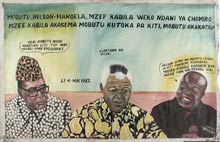 |
|
The Latin, or Roman, script is used throughout Africa, a legacy of European empire building and more than a century of colonial subjugation that began in the 19th century. In the 2nd century B.C. the Romans conquered Carthage in northern Africa and introduced the Latin (Roman) alphabet. With the spread of Islam and Arabic script there in the 11th century, Roman script fell into disuse. It returned to western Africa in the 15th century with the arrival of Portuguese explorers and traders. Through contacts with the Portuguese, Spanish, Dutch, Swedes, French and British, many Africans who were engaged in trade along the coastal regions learned to speak European languages.
Many Africans gained literacy in the Roman script, which they employed to write European languages as well as their own. Today, Roman script is used throughout Africa as a means of governance and international communication. In recent years African artists have appropriated Roman script as a critical tool in exploring how writing has dictated the telling and retelling of Africa's histories, and it thus allows them to question, rewrite and reclaim their heritage.
|

Banza Nkulu
Mobutu, Mandela and Kabila
1997
Acrylic on canvas
Collection of Bogumil Jewsiewicki
In this painting, Nelson Mandela, South African president from 1994 to 1999, is flanked by Congolese president Mobutu Sese Seko and his political rival, Lawrence Kabila. The written captions present Mandela's dilemma as arbiter; namely, how to ensure cooperation in an orderly transfer of power from one Congolese leader (Mobutu) to another (Kabila) in 1997. The lead caption in Swahili identifies the issue: "Mobutu, Nelson Mandela, [and] Mr. Kabila are inside a dhow [sailing vessel]; Mr. Kabila says Mobutu [should] leave the seat of power, Mobutu refuses." Mobutu's caption, in Lingala (the language of the army), expresses his reluctance to give up the presidency. Kabila states in Swahili, "Nelson says if Mobutu leaves the seat of power open, in a few days Kinshasa falls at the hands of the army." As mediator, Mandela's Swahili caption emphasizes, "To share [cooperate] is good."
|

|
|

|








